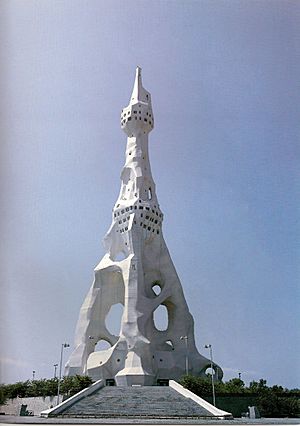Shinshūkyō facts for kids

Shinshūkyō is a Japanese word that means "new religions." In Japan, experts who study religions consider any religion started since the middle of the 1800s as a "new religion." These new religions are often inspired by much older traditional Japanese beliefs, like Shinto, Buddhism, and even Hinduism. They offer different ways for people to find meaning and community in modern times.
Contents
What Are New Religions?
New religions in Japan are groups that began in the last 150 years or so. They are different from very old religions like Shinto or Buddhism, which have been around for hundreds or thousands of years. Many of these new groups started during times of big changes in Japan, like after wars or when society was going through difficult periods. People often looked for new spiritual answers and ways to cope with life's challenges.
How Did They Start?
Many new religions began with a founder who had a special spiritual experience or message. This person would then gather followers who believed in their teachings. These groups often offered hope, healing, and a sense of belonging to people who felt lost or unhappy. They might focus on things like personal happiness, world peace, or living a healthy life.
What Do They Believe?
The beliefs of Shinshūkyō are very diverse, meaning they are all different! Some might focus on healing through prayer, while others emphasize living in harmony with nature. Many combine ideas from traditional Japanese religions with new ideas. For example, a group might use Buddhist teachings but also add new practices for meditation or community service. They often teach that people can improve their lives and the world through their actions and beliefs.
Common Themes in New Religions
Even though they are diverse, many new religions share some common ideas:
- Focus on the present: Many teach how to live a better life right now, rather than just focusing on the afterlife.
- Healing and well-being: Some groups emphasize physical or spiritual healing.
- Community: They often create strong communities where members support each other.
- Social action: Many encourage members to work for peace, environmental protection, or other good causes.
Why Are They Important?
Shinshūkyō play an important role in Japanese society. They show how people adapt their spiritual lives to modern times. For many followers, these religions provide a strong sense of purpose, a supportive community, and a way to understand the world around them. They also show how old traditions can inspire new ways of thinking and believing.
See also
 In Spanish: Shinshūkyō para niños
In Spanish: Shinshūkyō para niños

